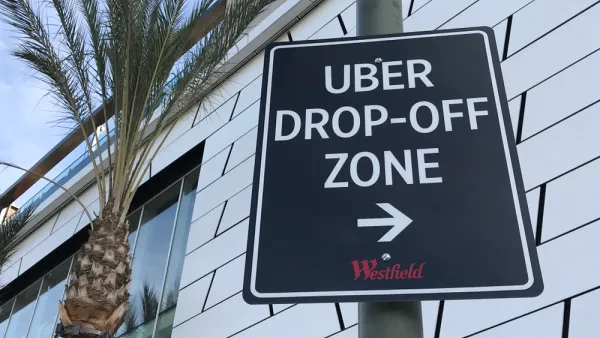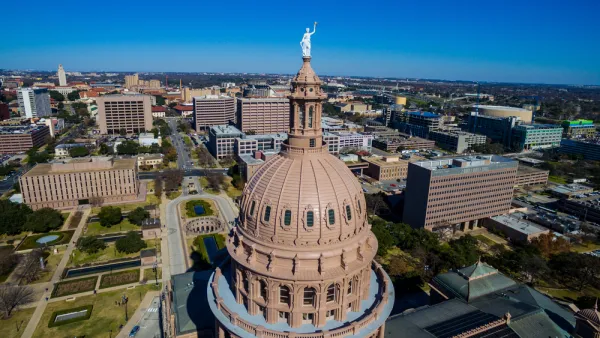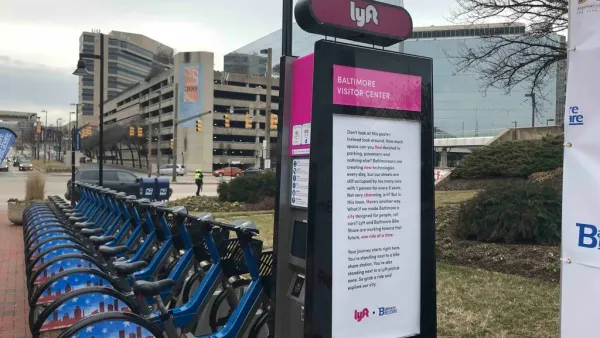Even after factoring in insurance, parking, depreciation, fuel, repair, maintenance and licensing, urban dwellers would pay half the costs to travel, on average, nearly 11,000 miles annually in their own new car rather than relying on ride-hailing.
"A new study from AAA finds that it can cost city residents twice as much to use ride-hailing services than it would to cover the same mileage in a car they own, even factoring in the cost of fuel, insurance and parking," reports Jason Plautz for Smart Cities Dive.
The study found that it would cost the average city dweller $20,118 a year to rely solely on ride-hailing services, compared to $10,049 a year in a new car including parking costs.
For urban dwellers with access to unpriced parking, "relying on ride-hailing services is nearly three times more expensive than vehicle ownership in these cities," according to the auto association's press release. Cost savings would be even greater by purchasing a used vehicle.
According to data from AAA’s annual Your Driving Costs study, the average annual cost to own and operate a new vehicle, the costliest form of vehicle ownership, is $7,321 for 10,841 miles of travel annually...Depreciation is the single largest expense for vehicle owners. By driving a pre-owned vehicle in good condition, ownership costs are significantly lower
"Whether you own a vehicle or not, ride-hailing services are a convenient transportation option,” said John Nielsen, managing director, Automotive Engineering and Repair. “However, with the average American city-dweller driving nearly 11,000 miles per year, a personal vehicle is still the more cost-effective choice.”
"Notably, the AAA study does not account for driving trips replaced by public transit, which is far cheaper per-mile than ride-hailing and can be used as a replacement for driving, depending on the scope of transit networks in a given city," adds Plautz. Biking, walking, and scooting should also reduce ride-hailing trips.
The July 2018 study, prepared by the AAA Foundation for Traffic Safety, appears in the form of a 2-page "fact sheet" that can be downloaded from the Aug. 21 news release.
AAA found that "[o]n average, those using ride-hailing services spent an average of $13.15 per trip, spending 15.11 minutes and traveling 6.66 miles. Ride-hailing costs include the occasional use of rental vehicles for longer distance travel. Full methodology can be found in the study’s fact sheet."
Other studies
In the "Dive Insight" section, Plautz points to two earlier studies that did not appearentirleyconsistent with the findings from the AAA study:
Writing in The Conversation [October 15, 2017], F. Todd Davidson and Michael E. Webber of the Energy Institute at the University of Texas at Austin calculated that one-quarter of the entire U.S. driving population would be better off relying solely on services like Lyft and Uber, factoring in the value of time spent in traffic
The Kleiner Perkins 2018 Internet Trends Report found that in four of the five largest U.S. cities — New York City, Chicago, Washington, DC and Los Angeles — ride-hailing was cheaper than car ownership, but the reverse was true in Dallas.
Lyft claims that "[i]n 2017 alone, almost a quarter of a million passengers on its platform dropped owning a personal vehicle, due to the availability of ridesharing specifically," according to TechCrunch writer Darrell Etherington.
One of the first studies to "quantify how the uptick in transportation network companies might be affecting consumer behavior" was performed by researchers at the University of Michigan Transportation Research Institute, Texas A&M Transportation Institute and Columbia University, reported Nicole Casal Moore for the University of Michigan News on August 10, 2017. The study was unique because it was based on surveys in Austin after the city banned Uber and Lyft in May 2016.
The study found that 41 percent of those surveyed turned to their own vehicle to fill the void left by Uber and Lyft. Nine percent actually bought an additional car for this purpose.
The researchers found a correlation between the level of inconvenience reported and the likelihood that a survey participant would buy a car. Inconvenienced residents were more than five times more likely to buy a car.
FULL STORY: AAA: Ride-hailing not a cost-effective replacement for car ownership

Analysis: Cybertruck Fatality Rate Far Exceeds That of Ford Pinto
The Tesla Cybertruck was recalled seven times last year.

National Parks Layoffs Will Cause Communities to Lose Billions
Thousands of essential park workers were laid off this week, just before the busy spring break season.

Retro-silient?: America’s First “Eco-burb,” The Woodlands Turns 50
A master-planned community north of Houston offers lessons on green infrastructure and resilient design, but falls short of its founder’s lofty affordability and walkability goals.

Test News Post 1
This is a summary

Analysis: Cybertruck Fatality Rate Far Exceeds That of Ford Pinto
The Tesla Cybertruck was recalled seven times last year.

Test News Headline 46
Test for the image on the front page.
Urban Design for Planners 1: Software Tools
This six-course series explores essential urban design concepts using open source software and equips planners with the tools they need to participate fully in the urban design process.
Planning for Universal Design
Learn the tools for implementing Universal Design in planning regulations.
EMC Planning Group, Inc.
Planetizen
Planetizen
Mpact (formerly Rail~Volution)
Great Falls Development Authority, Inc.
HUDs Office of Policy Development and Research
NYU Wagner Graduate School of Public Service




























